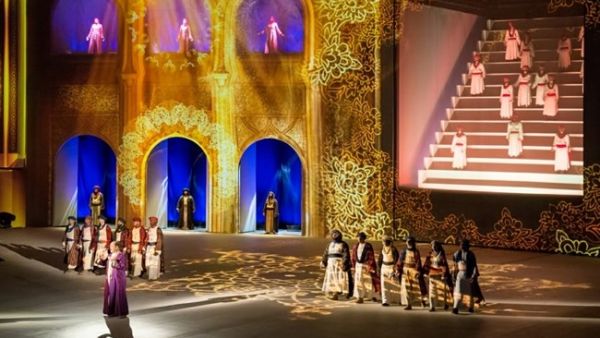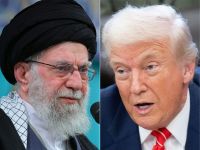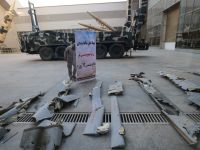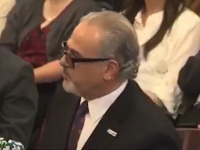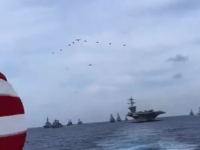Philippe Skaff used to be an ad man, but those days are behind him. “I left that business because after a while you just feel you are a hired hand for lying,” he says, sitting at a palatial dining table in his stylish Gemmayzeh apartment. A private elevator opens onto the first of two floors, sculptures are artfully scattered throughout the three living rooms and an interior green wall scents the air with blossom and wet earth. Skaff’s just finished screening a beautifully filmed recording of “Clusters of Light,” the enormously ambitious staging of the life of the Prophet Mohammad.
The 90-minute production was commissioned by the ruler of Sharjah Sheikh Sultan Muhammad al-Qasimi to mark the launch of the emirate’s celebrations after being named Islamic Capital of Culture 2014. As chief creative officer and chief executive officer, Skaff oversaw the project.
“This is a very refreshing project for me,” he continues.
“I can still use my creative juices, but for a noble cause – to make up for all the lies. From one extreme to another I guess.”
Skaff’s “creative project company” Multiple and Spinifex Group were commissioned to work on the project six months before the five April performances in Sharjah last year, in collaboration with Sharjah Media Center.
Billed as “the greatest story ever told,” the production was just awarded the prize for Best Visual Spectacular at the London-based Event Production Awards. It has been shortlisted for two further prizes, with winners set to be announced in June.
The performance blended state-of-the-art technology with classical poetry and extracts from the Quran. Performed in a purpose-built stadium modeled on a roman amphitheater, “Clusters of Light” employed live actors, quadcopters to create a light show in the night sky above the stage, a 12-ton purpose built cube, inside which actors could stand and 21 of the latest generation high-definition projectors to create a blend of prerecorded film footage and live action.
Skaff was reluctant to disclose the budget for the production. The Huffington Post reported that the stadium alone cost $40 million to build. Based on Skaff’s descriptions, production costs are estimated to have cost a further $20 million.
Skaff may no longer work in advertising, but his aim was to use “Clusters of Light” to counter the negative portrayals of Islam in the international press, and the pervasive focus on ISIS’ grisly acts in the name of the religion, and to present it in a different light. It’s a sort of rebranding.
“This piece of artistic work, if you want, you can judge it on two levels,” he says. “You can judge it on an artistic level, and allow me here to quote my partner Wassim Rizk: this is definitely a game-changer in this part of the world."
"This is Arabic content, but produced and done on an international level. It was obviously a big surprise for the 10,000 people who saw it and are now asking for it to be restaged."
“Second, and most important, is the subject matter itself. It’s dealing with a religion, one of the biggest religions on earth, and it’s a religion that today is in the headlines all the time.
“Unfortunately, the true values of Islam, which we discovered and which are displayed in this piece of work, are not respected. Actually those who are claiming to do things in the name of Islam, it is obvious when you see this piece and when you listen to the words of the prophet, they’re doing quite the contrary.
“So the message is very timely, and when you talk about anything, especially religion, it could be a boring subject. It’s very verbal. It’s dry. It’s controversial. People can talk endlessly. When you present in an artistic way and in an appealing way, with music, the message goes through much more easily.”
The production begins with the pre-Islamic period, then details the birth of the prophet, the Hijra from Mecca to Medina, the battle for the control of Mecca and Mohammad’s death. The prophet himself could not be represented on stage, so light projections of rolling waves, colorful sunsets and whirling Islamic patterns were used to create a sense of wonder.
“The story is very well-known,” Skaff says. “It’s telling it in this way and also, most importantly, putting an accent on message of peace and tolerance that exists in Islam, that has been later distorted by humans and by sects and by people. This is going back to the values and in the values you can see that, like Christianity, it is a message of liberation, of peace, of justice, of equality and respect and equality to women ... of tolerance, of compassion.
“You can quote the ruler of Sharjah here,” he suggests, “Sheikh Sultan bin Ahmed al-Qasimi. He told me, ‘Our response to those people, in Sharjah, is this. This is our response to these people.’ He said, ‘If we don’t do this, if we don’t present the real Islam, especially through culture and arts, we will end up with extremists in the Gulf. So this is our way of answering them. We will not answer them by their own means but through work like this.’ It would be nice actually to quote him.”
The team working on the project included 190 creative, production, technical, site and logistics professionals, as well as 186 international performers and another 750 behind-the-scenes staff.
Skaff stressed the international nature of the production. The libretto for the oratorio was written by Saudi Arabian poet Dr. Abdul Rahman bin Saleh al-Ashmawi. Richard Lindsay, an Australian national, is a key global creative partner in the show and the executive creative director of content and production.
The score was composed by Bahraini musician Khalid al-Sheikh and performed by the German Film Orchestra in Berlin. Christian Steinhauser, the show's music director, is German, Nigel Jamieson, the artistic director, is a Brit, the director Gavin Robins, is Australian and the assistant theatre director, Munjed al Sherif is Lebanese.
The actors who performed the battle scene belong to a Lebanese martial arts club and were flown in especially from Sydney. The cube was made in Canada. The costumes came from Italy.
Four well-known Arab stars, the UAE’s own Hussain Al Jasmi, Egyptian singer Ali Hajjar, Tunisian singer Lotfi Bouchnak and Palestinian Arab Idol winner Mohammed Assaf were flown to Dubai to record the vocals, with which they lip-synced on stage.
There is a possibility that the show might be restaged in Turkey or Egypt, Skaff says, or even a European country.
“This is one of the biggest stories ever told in the world,” notes the non-Muslim Skaff. “It’s like all religious stories. You take the three monotheistic religions, they all have a story. Except that the story of Islam is either unknown or misunderstood, and has never really been promoted like the Hebrew or Biblical stories, or the story of Jesus, which we reiterate every year.
“Only one piece of work has been done in the ’70s. It’s a movie called ‘The Message’ ... this is the next one. We see it as the next main thing since the ’70s about Islam.”


